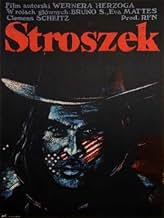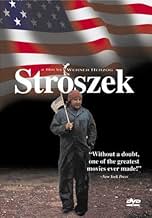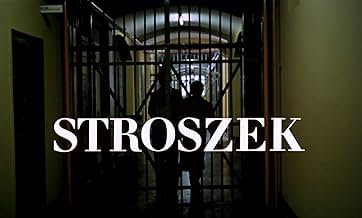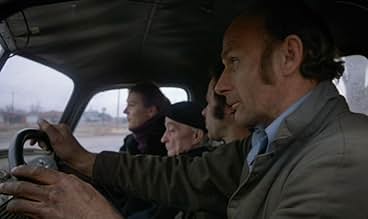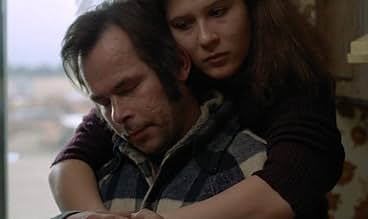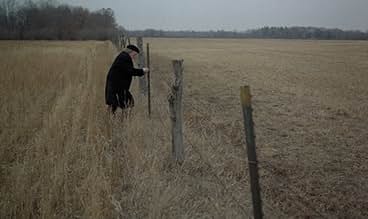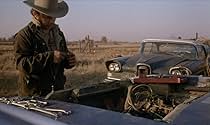In Berlin träumt ein vor kurzem aus dem Gefängnis entlassener Alkoholiker zusammen mit seinem älteren Freund und einer Prostituierten entschlossen davon, Deutschland zu verlassen und in Wisc... Alles lesenIn Berlin träumt ein vor kurzem aus dem Gefängnis entlassener Alkoholiker zusammen mit seinem älteren Freund und einer Prostituierten entschlossen davon, Deutschland zu verlassen und in Wisconsin ein besseres Leben zu suchen.In Berlin träumt ein vor kurzem aus dem Gefängnis entlassener Alkoholiker zusammen mit seinem älteren Freund und einer Prostituierten entschlossen davon, Deutschland zu verlassen und in Wisconsin ein besseres Leben zu suchen.
- Auszeichnungen
- 2 Gewinne & 2 Nominierungen insgesamt
- Scott
- (as Scott Mc Kain)
- Doctor
- (as Dr. Vaclav Vojta)
- Turk prisoner
- (as Yücsel Topcugürler)
- Trucker Pimp
- (Nicht genannt)
Empfohlene Bewertungen
There are certain messages in this film, and a probably important one is that it's hard to run away from trouble. Moving to a new city, or country in this case, doesn't always do it. When the prostitute leaves Stroszek for Vancouver, leaving him with a mortgage and no income, you know he's screwed. Beyond these elements, Stroszek is a movie with character but is not altogether impressive. Bruno Stroszek is interesting, but not as extraordinary as Kaspar Hauser. Ultimately, it leaves me a little underwhelmed.
A powerful, deeply moving film, 'Stroszek' is unique and unforgettable. It is a tender portrait of life on the margins of society that is most affecting. Herzog's characters are profoundly realistic creations and his story is full of poignancy. A movie about shattered dreams and dashed hopes, its themes are universal and its images captivating. At times, the precisely honed film feels improvisational or off-the-cuff; which is a credit to the unaffected nature of Herzog's writing and direction. Though there is a lot of humor in 'Stroszek,' it is ultimately a harrowing drama that speaks volumes about the human condition within our callous world.
'Stroszek' reunites Herzog with cinematographer Thomas Mauch, one of his more frequent collaborators. Mauch's naturalistic approach gives the film a documentary-like feel, which bolsters the faux-authenticity of Herzog's narrative. His juxtaposition of the constricting alleyways and streets of Berlin with the wide-open spaces of Wisconsin is arresting and effective. In the role of cinematographer, Herzog regularly uses Mauch, Jörg Schmidt-Reitwein or Peter Zeitlinger. The work of the latter two generally feature more stylizations and elaborate lighting, and possess a dream like atmosphere. For a human-centered drama like 'Stroszek,' the realism of Mauch's approach is most appropriate, as the haunting beauty of the resulting visuals prove.
The film boasts an atmospheric soundtrack, featuring songs by the likes of Sonny Terry and Chet Atkins. David Lynch has often stated that a successful film is comprised of "sound and image moving together through time," positing that, in scenes, visuals and sounds must complement each other; as they do masterfully throughout 'Stroszek'. Terry's 'Old Lost John' is utilized particularly well in one scene at the end of the film that sticks in the mind long after the credits have rolled (as it evidently did in Herzog's; he would re-use the song decades later to similar effect in 'Bad Lieutenant: Port of Call New Orleans').
Herzog has said that he doesn't like to "confront" his films alone during the editing stage, and until 1984, Beate Mainka-Jellinghaus assisted him during that process on all his cinematic endeavors. Their work for 'Stroszek' is flawless, and the film has a steady pace that never lets up. Additionally, the set design is muted, though highly detailed. Locations look long lived in, and the grittiness of their appearance adds to the overall narrative impact.
'Stroszek' stars Bruno S as the titular character. Partially inspired by himself, Bruno gives a tour-de-force performance of boundless depth, vulnerability and emotional perspicuity. He is someone you warm to immediately, and has your sympathies throughout. As does Eva Mattes- the only real professional actor involved- co-starring as Eva the prostitute. Her ease of performance and range leaves an indelible impression on the viewer, and you feel she really cares for Bruno. Also worthy of note is Clemens Scheitz's terrific turn as the elderly, comic Herr Scheitz and a troupe of performing chickens; who do most memorable work (despite the intense stupidity of their gaze).
A masterful and understated tragicomedy, 'Stroszek' is vintage Herzog. Boasting an insightful screenplay full of humor and drama in equal measure, the story is heartfelt and speaks of universal human truths. Seamlessly edited and shot with a distinct visual style, the film is timeless and terrific. Strongly acted and featuring an emotive soundtrack full of catchy tunes, this tale of broken dreams is one you'll find hard to forget.
The film handles the story of former asylum inmate Bruno S. (THE ENIGMA OF KASPAR HAUSER) as a Berlin street singer (in a role where he basically plays himself), who joins with his prostitute girlfriend Eva (Eva Mattes) and ageing eccentric friend Scheitz (Clemens Scheitz) to embark on a memorable journey, leaving modern Berlin, for the golden opportunities of America. The 'promised land' is represented by the dreary, austere town of Railroad Flats in rural Wisconsin, where they settle in a mobile home bought on credit, but it turns out America is not gonna fulfill their dreams that easily.
Shot in winter, Berlin is shown as a cold, forbidden and lacklustre place. Not a ray of sunshine. The dark facades of the battered apartment blocks, downlit bars filled with smoke and shabby characters, the only goal the folks in Bruno's world seem to have, is merely make the best of things.
Often read as a critique of how capitalist American society destroys the individual, Herzog sees the film as less a critique of the United States than as "a eulogy" in the wake of the American dream, for such shattered hopes could develop in virtually any country (see "Herzog on Herzog", p. 144). He does throw in some of the eccentricities of American life, but above all, it's a somewhat surreal account of three simple folks, short-changed in life, desperately trying to make ends meet. From the start it's clear that these three are made for each other. They simply do not fit in any stratum of society really. They're too fragile for the world of pimps and low lives that formed the background of their lives in Berlin. Although not dumb, Bruno is too half-witted to be taken seriously by most people. Eva's background is not fully explained, but she's emotionally fragile and dependent, while elderly Scheitz's chances to get ahead in life seems to lay in the past.
It's a bleak and uncompromising film, this tragicomic account of this odd trio in pursuit of a better life outside the dreary confinements of Berlin's lower casts of society, but it's so intensely moving and honest with its subjects, that alone is something to admire.
Camera Obscura --- 9/10
Wusstest du schon
- WissenswertesThe entire crew disliked the last sequence so much that director Werner Herzog had to shoot it by himself. Incidentally, he considers this scene the best he has filmed.
- PatzerAfter Bruno, Eva and Scheitz buy a used car, they drive out to Wisconsin. The camera's shadow is visible on the car as Eva drives.
- Zitate
[last lines]
Deputy Sheriff: We have a 10-80 out here, a truck on fire, we have a man on the lift. We are unable to find the switch to turn the lift off, can't stop the dancing chickens. Send an electrician, we're standing by.
- SoundtracksOn the Way Down to Phoenix
Written and Performed by Chet Atkins
Top-Auswahl
- How long is Stroszek?Powered by Alexa
Details
- Erscheinungsdatum
- Herkunftsland
- Sprachen
- Auch bekannt als
- La balada de Bruno S
- Drehorte
- Plainfield, Wisconsin, USA(hold up on North Street)
- Produktionsfirmen
- Weitere beteiligte Unternehmen bei IMDbPro anzeigen
Box Office
- Weltweiter Bruttoertrag
- 3.451 $

